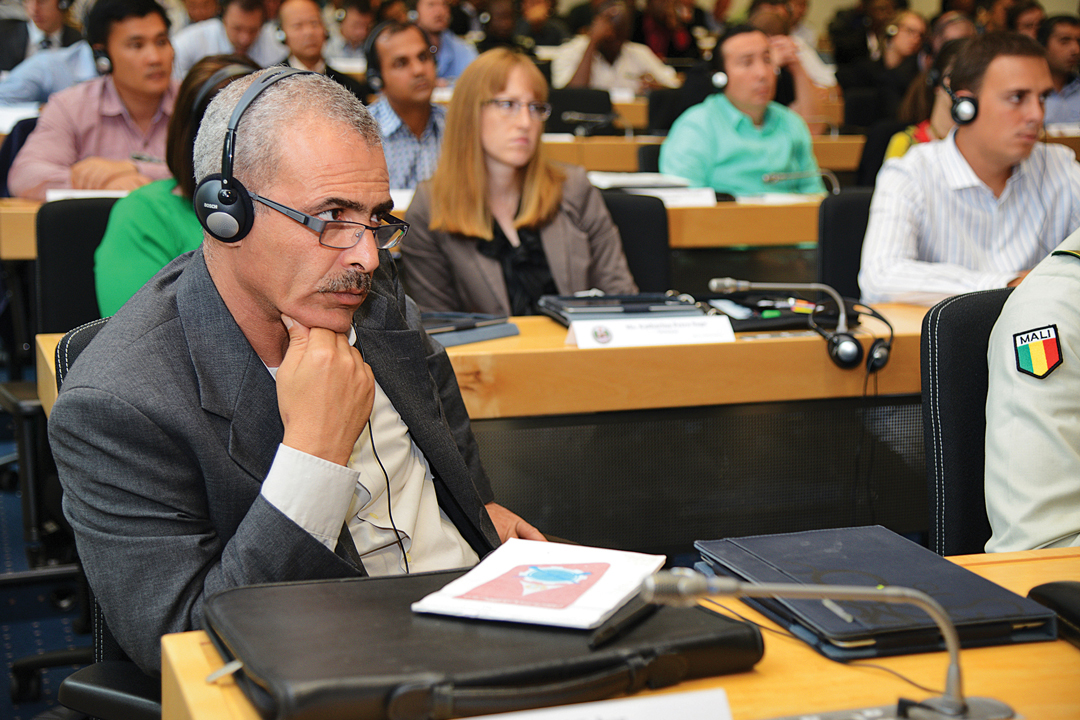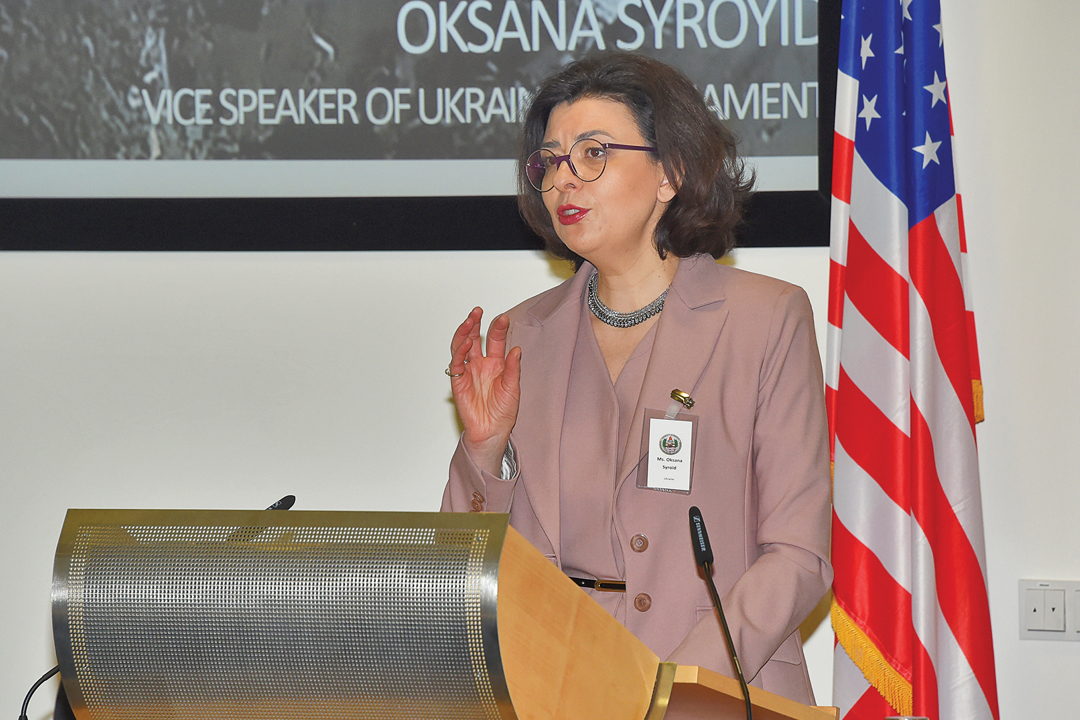The Marshall Center Turns 30 Amid a Zeitenwende
By Dr. Katrin Bastian and Dr. Ralf Roloff, Marshall Center professors
On June 5, 2023, the George C. Marshall European Center for Security Studies celebrated its 30th anniversary amid tremendous disruption on the European continent caused by Russia’s unprovoked and unlawful invasion of Ukraine on February 24, 2022. To most Europeans — although warned by previous Russian aggression in Ukraine and the annexation of Crimea in 2014 — the unthinkable happened: the violation of territorial sovereignty by full-scale war. The Marshall Center responded quickly by operationalizing the full bandwidth of its programs to focus on the impact of the attack and its implications for the trans-Atlantic alliance, the European Union and beyond. More than 30 years after the fall of the Iron Curtain and the collapse of the Soviet Union, the Kremlin shocked the world again with the degree of revanchism and sheer brutality. It was also a vivid reminder of why the Marshall Center was established in the first place.
In the early 1990s, the Marshall Center started as a strong German-American partnership. Germany and the United States agreed to establish a center for security studies that could support the challenging transformation of the former communist states and societies into democratic and well-governed countries that would eventually integrate into Western security structures, such as NATO and the EU. Establishing a working system of security cooperation with former Warsaw Pact countries and former Soviet republics was at the core of the Marshall Center’s work during its first decade. Security sector reform and democratic control of armed forces were the main areas of focus of studies and programs. Courses initially lasted for nine months, not just due to the quantity of subject matter to be covered, but also to establish the working interpersonal relationships and networks that are fundamental to security cooperation.

The post-Cold War decade ended abruptly with the terrorist attacks against the U.S. on September 11, 2001. This date marks a significant shift in world politics, and again, a remarkable mission change for the Marshall Center. Building a global coalition for the war on terror became a major focus. This shift in mission resulted in the creation of one of the very first programs on countering terrorism worldwide. With the ongoing global efforts in this regard, and the large military interventions in Afghanistan and Iraq, demand grew for support by qualified academic programs at a strategic level. New resident programs were developed focusing on stability, reconstruction and transformation, the limits of military and civilian interventions, operations and missions, and a program on homeland security and internal crisis management that compared U.S. and European approaches. These new programs were a strong response to the growing demand from partner countries, as well as from American and German stakeholders.
Academic programs developed further in the direction of analyzing transnational security challenges, and soon included a full-fledged resident program on countering organized crime. As cyberspace morphed into the backbone of the international economy, society and security, the Marshall Center engaged at a very early stage in developing a cyber-security program that went beyond technical questions to take a broader strategic look. In many aspects, matters of interest moved from regional toward transnational and global issues.
This discussion was surpassed by real live events: In 2008, the Russia-Georgia war brought regional security issues back onto the agenda. Furthermore, the Ukraine crisis and Russia’s annexation of Crimea in 2014 vividly illustrated that the European security order was under serious threat and the spirit of the Charter of Paris of 1990 was gone. The Marshall Center quickly adapted to this new reality by introducing a Seminar on Regional Security (SRS), and a European Security Seminars series (ESS-Series). The curriculum addresses in-depth relevant security issues in an ever-changing and challenging European and global environment, while the College for Security Studies has significantly increased the number of nonresident and outreach events. It is of note that the high academic standard of the curriculum grants the College’s seminars accreditation under the Bologna process, enabling students to collect credit points for their graduate-level programs.
In order to participate more systematically in the German, U.S. and international security discourse, the Marshall Center began to engage in strategic initiatives with well-established institutions and think tanks, such as the Munich Security Conference, the German Marshall Fund, the Federal Academy for Security Policy/Bundesakademie für Sicherheitspolitik, the Aspen Institute and the German Council on Foreign Relations/Deutsche Gesellschaft für Auswärtige Politik.

In spring 2020, all in-person events abruptly ended. And like most other colleges, schools and academies around the globe, the COVID-19 pandemic forced the Marshall Center to switch to virtual teaching and learning. With networking and personal interaction being at the core of its mission, social distancing posed a true challenge. Adapting to the new restrictions, faculty and participants switched to digital learning and the Marshall Center continued to invest in sustaining its alumni network of security professionals. In May 2022, the Center celebrated the graduation of its 15,000th alum.
The pandemic affected not only individual lives, but also disrupted the world economy and global supply chains — reshuffling the cards in the game of strategic competition. The downsides of global connectivity suddenly became perceptible. Strategic competition soon became a key theme of research in Marshall Center programs looking at the whole spectrum of international competition for natural resources and economic weight, military power, political influence and philosophical beliefs.

Internally, the Marshall Center reflected on its own structure to adapt to these global changes. It engaged in a process to more clearly define its mission, vision and strategy. This involved a thorough organizational optimization to include bringing back the Ambassador-in-Residence position and creating an integrated Strategic Communication unit. The Center initiated a curriculum review to further scrutinize the choice of topics and the academic quality of knowledge transfer in light of the new reality and European political events since 2020.
Russia’s second invasion of Ukraine, in February 2022, came as a shock, but eventually had the effect of (re)uniting the “political West” with a more robust alignment within the trans-Atlantic alliance, the EU and the G-7. Instead of dividing the West, the Kremlin’s actions motivated Finland and Sweden to apply to join NATO. Ultimately, Russian aggression yielded the opposite of its intended result, further enhancing EU-NATO cooperation and coordination.
In response to the increase of gray-zone conflict and information warfare, the Marshall Center moved forward to place special emphasis on Russia and strategic competition, cybersecurity and irregular warfare/hybrid threats. At the same time, the Center expanded to include the persistent and increasingly important challenges of climate change and its nexus to human and national security, the weaponization of interdependence, the battle for political narratives, and the liberal world order. This is showcased in the prioritization of activities in the Western Balkans, supporting the path of six Southeast European accession candidates toward EU membership, and in its programs with Ukraine, Moldova and Georgia.

The complex challenges to U.S. and European security and values such as peace, democracy, freedom and human rights, call for the continuation of a strong German-American partnership. Germany’s declared intent to initiate a “Zeitenwende” and invest more in security and defense has been a strong signal of alignment with Washington and an implicit admission that the formula “change through trade” has reached its limits. The war in Ukraine has demonstrated to the U.S. the importance to further engage and invest in Europe’s regional security.
The George C. Marshall European Center for Security Studies is in an excellent position to promote the trans-Atlantic, U.S.-European bond and friendship now and in the future. Over the past 30 years, the Center has proved that there is a need for such an institution with exclusive value in the security landscape. With the mission to educate, engage and empower security partners to collectively affect regional, transnational and global challenges, the Marshall Center is on the right track toward its vision: to be the unique German-American partnership and trusted global network that promotes common values and advances collaborative geostrategic solutions. Happy birthday, Marshall Center!


Comments are closed.